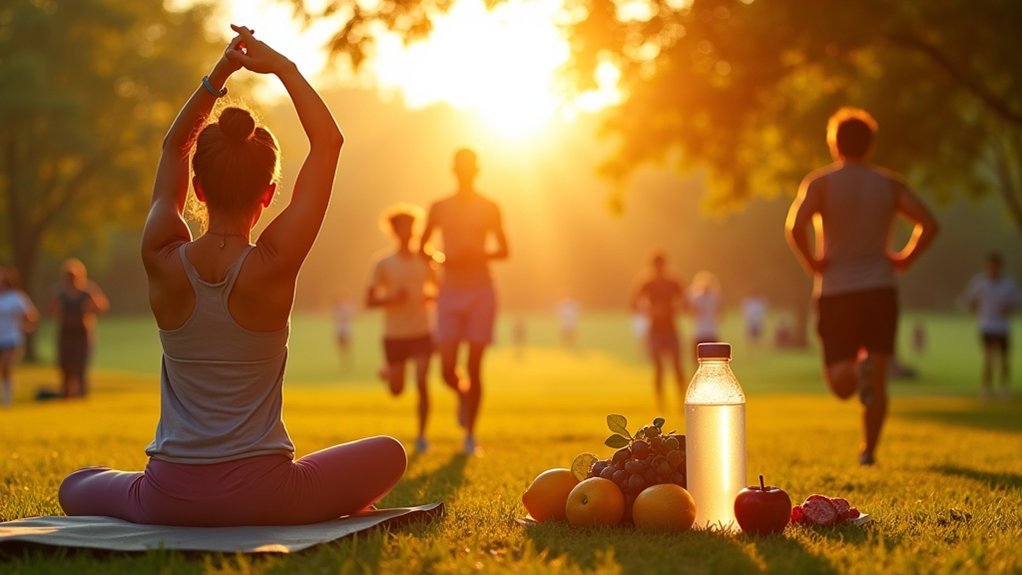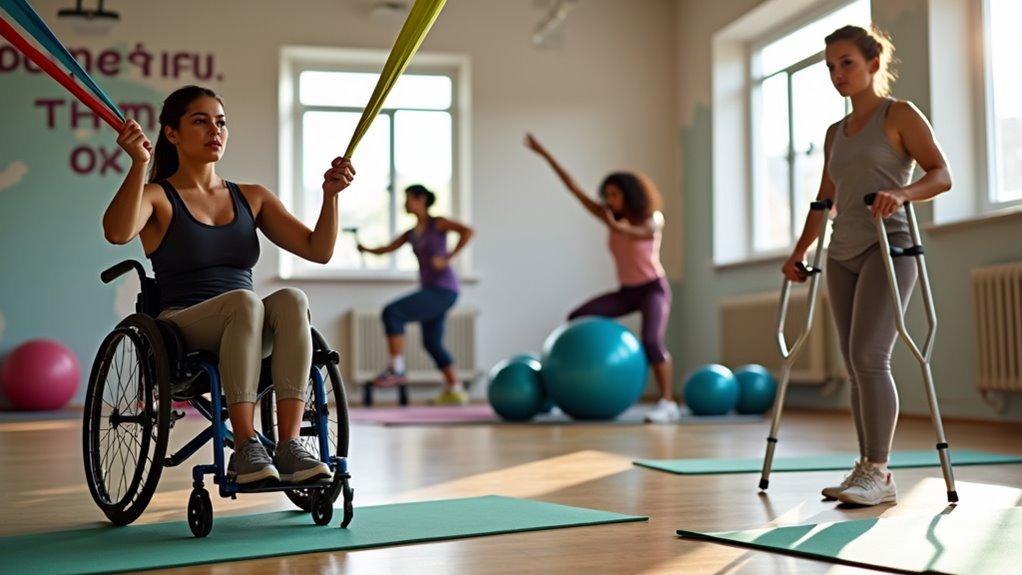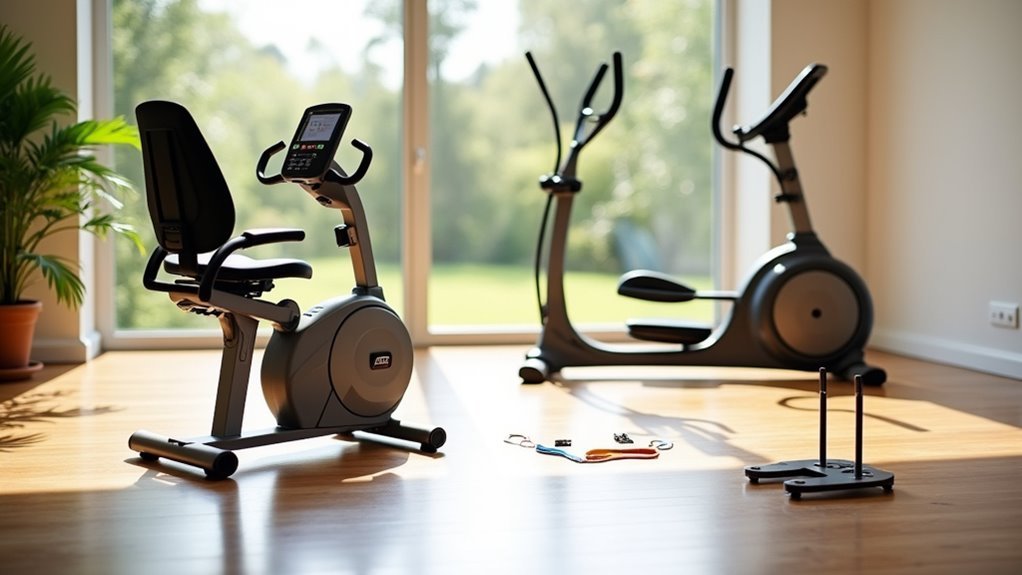Regular physical exercise supports your brain health in powerful ways. Aim for 150 minutes of weekly cardio, add strength training twice weekly, practice yoga or tai chi, take nature walks, stay hydrated, prioritize 7-9 hours of quality sleep, play brain games, exercise socially, maintain proper nutrition with omega-3s, and incorporate small movements throughout your day. These ten habits will sharpen cognitive function and protect your mental clarity as you age. Discover how each practice transforms your neural connections.
10 Fitness Habits for a Keen Mind

While many people exercise to maintain physical health, the benefits of regular movement extend far beyond toned muscles and cardiovascular strength. Your brain craves physical activity just as much as your body does.
Just 150 minutes of regular physical activity weekly can increase your hippocampus size, dramatically improving memory and cognitive function. Adding dance moves to your routine isn’t just fun—it can reduce dementia risk by up to 76% while enhancing mental fitness.
The mind-body connection isn’t theoretical—it’s measurable in your growing hippocampus when you commit to regular movement.
Strength training for six months prevents hippocampal shrinkage, directly supporting brain health. Practices like tai chi can help sharpen reasoning and multitasking abilities, particularly as you age.
Even small movements throughout your day contribute to emotional wellbeing and protect against cognitive decline. Your brain’s future depends on how you move your body today.
Daily Cardiovascular Exercise: Boosting Brain Circulation
Your brain’s importance depends largely on blood circulation, making cardiovascular exercise a critical daily habit for cognitive health. When you commit to at least 150 minutes of aerobic exercise weekly, you’re not just strengthening your heart—you’re enlarging your hippocampus, the memory center of your brain.
Regular cardio workouts trigger the production of brain-derived neurotrophic factor, a protein that supports neuron growth and enhances learning capabilities. This daily practice improves mental clarity while reducing dementia risk by up to 76%.
Whether you’re cycling, swimming, or taking brisk walks, these activities increase oxygen-rich blood flow to your brain, optimizing cognitive function.
For maximum brain health benefits, incorporate daily cardiovascular exercise into your routine—your memory, attention span, and overall well-being will thank you.
Strength Training for Cognitive Resilience

Beyond cardiovascular exercise, adding resistance training to your fitness regimen creates a powerful formula for brain health. Research shows that strength training prevents hippocampal shrinkage, critical for memory and learning, with measurable cognitive improvements over just six months.
You’ll benefit from enhanced cognitive function as resistance exercises promote healthy synapses and improve executive functions like reasoning and planning. This is particularly valuable if you’re experiencing mild cognitive impairment.
For older adults, the benefits are striking—a 2018 study found significant cognitive performance improvements among seniors who lifted weights compared to those who didn’t.
The science points to increased levels of brain-derived neurotrophic factor (BDNF) from consistent strength training, supporting neuron growth and cognitive resilience throughout aging.
Mind-Body Practices: Yoga and Tai Chi Benefits
The ancient practices of yoga and Tai Chi function as moving meditations that sharpen your mind while strengthening your body.
Your brain benefits from the balance and coordination challenges these disciplines present, creating new neural pathways and improving cognitive resilience.
You’ll find these practices particularly valuable for their stress reduction techniques, which lower cortisol levels and protect brain function during aging.
Moving Meditation Benefits
While physical exercise strengthens your body, mind-body practices like yoga and Tai Chi offer a unique cognitive advantage through their meditative movement patterns.
These practices improve your mental function by integrating unfamiliar movements with mindfulness and controlled breathing.
Research shows that just 12 weeks of regular yoga practice markedly enhances both verbal and visual-spatial memory.
Similarly, Tai Chi boosts reasoning, planning, and multitasking abilities—particularly beneficial for those with mild cognitive impairment.
The combination of movement and meditation reduces stress while promoting structural brain changes, including increased volume in key cognitive areas.
You’ll benefit from these practices regardless of age, though they’re especially valuable as you grow older.
The cognitive resilience you develop through consistent yoga and Tai Chi practice helps maintain your mental clarity and processing speed long-term.
Balance and Coordination
As you focus on enhancing your mental capabilities, mastering the balance and coordination components of yoga and Tai Chi delivers profound cognitive benefits beyond mere physical stability.
These practices require learning unfamiliar movements that challenge your brain, greatly improving verbal and visual-spatial memory.
When you regularly practice Tai Chi’s flowing motions or yoga’s precise postures, you’re actually increasing your brain volume and enhancing your prefrontal cortex activity—the command center for reasoning and planning.
The mindfulness aspects of these exercises reduce stress while improving emotional regulation, creating ideal conditions for superior cognitive function.
Your commitment to these mind-body practices isn’t just about staying physically fit—it’s a powerful investment in your brain health that can reduce your dementia risk by up to 76%.
Stress Reduction Techniques
Beyond their physical benefits, yoga and Tai Chi serve as powerful stress-fighting tools that directly enhance your cognitive performance.
These mind-body practices greatly reduce stress by lowering cortisol levels, which protects your brain from harmful effects of chronic tension. When you practice yoga’s mindful movements, you’re not just stretching—you’re building verbal and visual-spatial memory through skill learning and unfamiliar movements.
Tai Chi stimulates your prefrontal cortex, boosting mental agility, reasoning, and planning abilities. The mindfulness component in both practices helps calm the mind, allowing you to improve concentration and maintain present-moment awareness.
Regular practitioners enjoy a remarkable 76% reduced risk of dementia, demonstrating these aren’t just relaxation techniques—they’re cognitive protection strategies. Incorporating either practice into your routine offers a sustainable way to sharpen your thinking while managing daily stress.
Strategic Hydration for Optimal Brain Function
Your brain depends heavily on proper hydration to function at its peak. With 75% water composition, your brain requires consistent fluid intake to maintain cognitive abilities and neurotransmitter function. Even mild dehydration can reduce cognitive performance by impacting attention and memory.
| Hydration Level | Effect on Brain | Action Steps |
|---|---|---|
| Ideal | Enhanced cognitive performance | Drink 3.7L (men) or 2.7L (women) daily |
| Slight dehydration | 20% reduction in mental function | Carry a water bottle everywhere |
| Moderate dehydration | Impaired concentration | Set hydration reminders |
| Severe dehydration | Memory difficulties | Eat water-rich fruits and vegetables |
| Chronic dehydration | Long-term brain health concerns | Track daily water intake |
Boost your brain health by strategically consuming water throughout the day and incorporating hydrating foods like cucumbers and strawberries into your diet.
Nutrition Choices That Enhance Neural Connections

Your brain’s cellular architecture thrives on omega-3 fatty acids found in salmon and walnuts, which strengthen neural connections and enhance cognitive function.
Complement these brain-building fats with antioxidant-rich berries and dark chocolate that combat oxidative stress and protect your neural networks.
For maximum cognitive benefits, you’ll want to embrace a Mediterranean-style eating pattern while ensuring adequate hydration, as even mild dehydration can impair your mental performance and information processing.
Brain-Fueling Foods
While physical exercise strengthens your body, what you eat directly fuels your brain’s complex neural network. Incorporating omega-3 fatty acids from salmon, walnuts, and flaxseeds promotes neuron growth and enhances cognitive function by strengthening synaptic connections.
Combat cognitive decline with antioxidant-rich foods like blueberries, dark chocolate, and leafy greens, which protect against oxidative stress. The Mediterranean diet, with its emphasis on fruits, vegetables, and healthy fats, supports mental health through anti-inflammatory properties that reduce dementia risk.
Don’t overlook foods high in vitamins E and C—almonds and oranges maintain neural health while flavonoid-containing berries and citrus fruits improve memory by enhancing blood flow to the brain.
These brain-fueling foods work synergistically to maintain peak cognitive performance throughout your lifetime.
Hydration for Cognition
Beneath the complex neural networks that power our thoughts lies a fundamental truth: water fuels cognitive function at its most basic level.
With your brain being roughly 75% water, proper hydration directly impacts your memory, focus, and mental clarity.
You’ll experience improved cognitive processing when you maintain ideal hydration throughout your day. Even mild dehydration can disrupt neural communication and impair critical thinking.
- Drink water consistently to enhance short-term memory and processing speed
- Consume hydrating fruits and vegetables to supplement fluid intake while providing brain-supporting nutrients
- Notice improved mood and reduced anxiety when properly hydrated
- Combat mental fatigue by ensuring adequate water intake before it affects your performance
Don’t wait until you’re thirsty—by then, your brain health and cognitive abilities may already be compromised.
Sleep Hygiene: The Foundation of Mental Clarity
When cognitive performance matters most, sleep quality stands as the cornerstone of mental clarity. Your brain requires 7-9 hours of quality sleep nightly to properly consolidate memories and regulate emotions—two critical components of peak cognitive function.
Neglecting sleep hygiene puts you at risk for cognitive decline and even Alzheimer’s disease. To protect your mental acuity, establish a consistent sleep schedule that works with your body’s internal clock.
Create a comfortable sleep environment free from distractions and limit screen time before bed.
Remember that poor sleep directly impairs your attention, problem-solving abilities, and decision-making processes. By prioritizing quality rest, you’re not just avoiding fatigue—you’re actively building the foundation for sharper thinking and emotional resilience throughout your day.
Nature Walks for Stress Reduction and Focus
After you’ve established healthy sleep habits, stepping into natural environments can dramatically enhance your cognitive abilities.
Nature walks serve as powerful tools for stress reduction, with research showing they lower cortisol levels while boosting mental fitness. You’ll experience improved focus and cognitive function as your mind clears in green spaces.
- Your emotional regulation improves as nature reduces rumination, helping you process thoughts more effectively.
- Mindfulness happens naturally outdoors as your senses engage with the environment around you.
- Your focus sharpens after spending time in natural settings, making complex tasks easier.
- The dual benefits for physical health and mental clarity create a compound positive effect on overall wellbeing.
Incorporate these walks into your daily routine to build resilience against stress while enhancing your mind’s performance.
Brain-Training Games and Puzzles
While nature nurtures your mind externally, your brain also thrives on direct mental stimulation through targeted exercises. Incorporating brain-training games into your daily routine can greatly boost your cognitive abilities and build mental agility.
Crossword puzzles and Sudoku strengthen problem-solving skills and processing speed, while jigsaw puzzles activate your visual-spatial reasoning, helping protect against cognitive aging.
Card games improve memory by increasing brain volume in critical regions while enhancing strategic thinking.
Word games that challenge your vocabulary engage multiple brain regions, improving overall cognitive performance and critical thinking.
These brain exercises help develop cognitive resilience—your mind’s ability to adapt and recover from challenges.
Social Exercise: The Cognitive Power of Group Activities
Though individual exercise benefits your brain substantially, the cognitive advantages of social workouts multiply when you add other people to the equation.
Group exercise fosters connections that protect against cognitive decline while enhancing your emotional well-being. When you participate in social activities, you’re simultaneously strengthening your body and cognitive function through meaningful interactions.
- Team sports and fitness classes create accountability, helping you maintain consistent physical activity levels essential for brain health.
- The social component reduces stress, building resilience that supports both mental health and cognitive performance.
- Group settings naturally boost your mood and cognitive flexibility through positive interactions.
- Communicating and coordinating with others during exercise provides additional mental stimulation beyond solo workouts.
Frequently Asked Questions
How Quickly Can Fitness Changes Improve Cognitive Function?
You’ll notice cognitive improvements within 2-4 weeks of regular exercise. Even a single workout can boost your brain function temporarily, while consistent training delivers more substantial, lasting benefits to your thinking and memory.
Can Fitness Reverse Existing Cognitive Decline?
Yes, you can partially reverse cognitive decline through fitness. Regular exercise improves blood flow to your brain, stimulates neuron growth, and reduces inflammation. You’ll see benefits within weeks of starting a consistent routine.
Are Certain Exercises More Beneficial for Specific Cognitive Skills?
Yes, certain exercises boost specific cognitive skills. Aerobic activities enhance memory and attention, while coordination exercises improve spatial awareness. You’ll find balance training sharpens decision-making, and mindful movement practices like yoga strengthen focus.
How Do Fitness Benefits Differ Between Children and Seniors?
You’ll find children gain developmental benefits like coordination and brain growth from fitness, while seniors preserve cognitive function, reduce dementia risk, and maintain independence. Both groups enjoy mood enhancement, but with different long-term outcomes.
What’s the Minimum Effective Exercise Duration for Brain Health?
You’ll see brain benefits from just 10-15 minutes of daily activity. Even short walks help, but aim for 150 minutes weekly of moderate exercise for ideal results. Consistency matters more than duration for mental sharpness.
In Summary
By adopting these ten fitness habits, you’re not just building a stronger body—you’re cultivating a sharper mind. Make these practices part of your daily routine, and you’ll notice improved focus, better memory, and enhanced problem-solving abilities. Remember, your brain’s health doesn’t exist in isolation from your physical wellbeing. Start with just one habit today, and you’ll be amazed at how quickly your mental clarity improves.





Leave a Reply